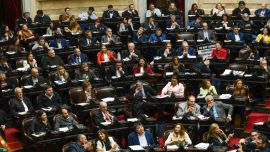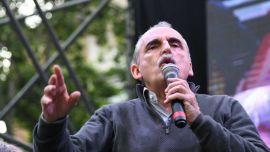President Javier Milei’s government is withdrawing key fiscal measures from its sweeping ‘Omnibus bill’ reform package after facing stiff political opposition, Economy Minister Luis Caputo announced late Friday.
"We have listened to everyone, and in fact, we share a good part of those demands," Caputo said at a press conference.
The measures included tax and pension reforms. Articles on a capital whitewash, tax moratorium, changes in wealth and high income taxes and export duties, along with changes in the calculation of pension increases, which have been questioned by legislators and governors of provinces that would be affected, have also been removed, said Caputo.
The minister said that the law had "two well differentiated chapters: a chapter of more than 500 articles that imply a structural change in the country, a regulatory and structural change that will lay the foundations so that the country can really develop and grow during the next 10 to 20 years."
"There is a fiscal chapter included in the law with the aim of reaching our commitment that we have with society to balance fiscal accounts, to reach zero deficit," said Caputo. "We found in this dialogue that we have had this week with the different actors a clear consensus in what we believe is the most important part of the law, which are these more than 500 articles that, as I say, are what have to lay the foundations for growth."
"There has been some disagreement, as you all know, regarding the economic chapter," the minister continued. "We do not want this fiscal chapter to delay something that we consider urgent and necessary."
The rest of the bill, still being put forward, intends to introduce sweeping changes and deregulation to Argentina's economy.
The law, dubbed the ‘Omnibus Law’ because of its breadth, aims to revolutionise Argentina's economic system by changing hundreds of laws and regulations and is complemented by a 366-article decree with more rule-slashing measures.
Many of Milei's reforms thus far are being challenged in court, with more than 60 lawsuits under way by labour unions, business chambers and NGOs.
The withdrawal of the fiscal portion of the bill "does not imply that we are going to give up our commitment to achieve fiscal balance, our goal of zero deficit," Caputo said.
"We are just going to give ourselves a little more time" to negotiate the reforms, he added.
The government wants to "achieve something at the risk of losing everything" in its legislative battle.
Milei said this week that the nation is closer to being able to comply with his proposal to dollarise the economy, which Caputo agreed with.
"Dollarisation is a goal of this government and it will be done when the conditions are right. Today the conditions are better than when we took office," Caputo said.
Tens of thousands of Argentines took to the streets earlier this week and many downed tools in a major challenge to Milei's budget-slashing policies.
As an outsider candidate, Milei rode a wave of anger over decades of economic decline to win the December election.
Under the slogan "There's no money," he vowed to drastically cut spending in Argentina, where inflation exceeded 200 percent last year.
He has since devalued the peso by more than 50 percent, cut state subsidies for fuel and transport and reduced the number of ministries by half.
But many citizens fear Milei's package of deregulation and economic reform will leave them vulnerable to exploitation, and even poorer.
– TIMES/AFP

























Comments